Views expressed in opinion columns are the author’s own.
The SGA election season is easily one of my least favorite times to be a University of Maryland student — with an honorable mention to Terp Thon season. While COVID-19 has reduced the risk of being flagged down on my way to class to take a survey, Student Government Association parties are still extremely active, campaigning on Zoom and various social media platforms.
In last year’s SGA elections, the biggest issue was because party goals were so similar, there weren’t a lot of ways to actually differentiate between ImpactUMD and Forward Maryland, making the entire process seem very performative and uninspiring. This time, the opposite has occurred — Activate Maryland and SGA presidential candidate Kislay Parashar will be running entirely unopposed.
It’s obvious that informed, enthusiastic voters make for better election results, particularly in a college campus setting. Wouldn’t students be even less inclined to participate in elections when the entire ballot is running unopposed? At the bare minimum, a two-party election would present opportunities for each party to pitch themselves to the student body. With one party, it may be hard to engender any enthusiasm about the process. If Activate Maryland really wants to make substantial changes at this university, they need to take advantage of their position as the only party and propose some more direct, consequential policies.
I don’t anticipate that having only one party this year will make SGA elections any more engaging for students, especially when the issue last year was a severe lack of actual, healthy debate on real issues. I also think it makes it more difficult to clearly determine a party’s stance on controversial topics like the Boycott, Divestment and Sanction movement, University of Maryland Police and athletics funding. It isn’t at all surprising that voter participation in SGA elections hovers around an abysmal 10 percent every year.
Everyone on the Activate Maryland ticket will likely win their position without any resistance. From a more positive perspective, it may be easier for the SGA to produce support for the measures they want to see because there’s no need to reach across the aisle or coalition-build. At the same time though, this means there likely won’t be another party present in the SGA that can “check” Activate Maryland if necessary. There are multiple aspects of this university that need to be severely altered, and two active parties could help steer the SGA to more holistic solutions while also presenting students with real options.
The current Activate Maryland platform aims to “make education accessible to students, develop a diverse and inclusive culture on campus, focus on sustainability and work with student organizations,” as well as housing affordability. While I think these are all good things that would have some positive impact on the university community, they are still somewhat vague goals that seem to have been brought up every single election in my four years here.
Personally, I would be much more engaged in the process if the SGA had proposals that focused more on directly impacting the lives of everyone who lives and works at UMD. Does Activate Maryland have any ways to challenge the disproportionate amount of funding that goes towards STEM and athletics while campus workers struggle to receive fair pay, resources, and working conditions?
Are there specific plans in place to help achieve any of the 31 urgent demands made by Black student leaders and graduate students to rectify the racism that this campus is built on? Could we disarm University Police, or even just make sure, that every single spot and entrance on campus is accessible for people who are disabled? If Activate Maryland wants more than 10 percent of students to vote, then they should adopt fresh, relevant policies that could radically change the nature of our campus — especially because they are the only party on the ballot.
This all leads me to ask: who is the SGA really for? I came into this university thinking it was a clout-chasing, resume-building activity for people who are too into Aaron Sorkin’s work rather than the direct, material needs of their fellow students. While having only one option on the ballot doesn’t do much towards alleviating that perception, I truly hope Activate Maryland chooses to challenge the status quo rather than accept business as usual.
Malcolm Ferguson is a senior English and government and politics major. He can be reached at mferguso@terpmail.umd.edu.



